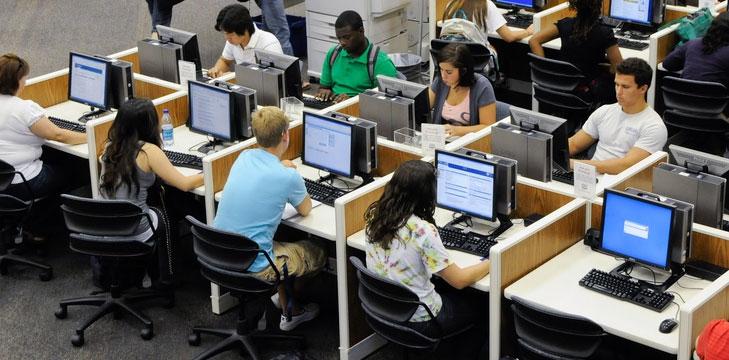Computerized testing is on the rise
Students are taking computerized tests in a library.
September 24, 2015
Thirty-two students sit in a computer lab, furiously trying to finish their tests in time. Rather than the sound of pencil scratching on paper, the sound of students’ fingers tapping on keyboards fills the air.
Last year’s junior class took the new MEAP on computers for the first time, emphasizing that computerized testing is the wave of the future. Principal Neil DeLuca believes there are advantages to computerized testing.“One change we made was to change the MEAP to electronic testing that helped get the results back quicker,” Mr. DeLuca said. “I think the state is trying to transition to electronic testing too. It saves on resources and saves on money.”
Sophomore Rohan Singh believes that electronic testing is more preferable to paper testing for a variety of reasons. He thinks that it’s more convenient for students as well.
“It’s faster and it spell checks,” Singh said. “If you forget your pencil on a test day, it doesn’t matter because you don’t need it for electronic tests. If someone has bad handwriting, your teachers will be able to understand what you typed. Autosave prevents you from losing your work.”
Mr. DeLuca also talks about how teachers are utilizing electronic testing and how many teachers at RHS have opted to pilot ZipGrade, which provides the teacher and students with immediate itemized results.
“It’s up to the teacher to decide what to do,” Mr. DeLuca said. “It’s tough for me to know about that with so many teachers so we empower them to make the decision.”
Science teacher Mrs. Sara Rosell is taking advantage of this opportunity to get students experienced with computerized tests.
“It’s been four years since I started using electronic testing,” Mrs. Rosell said. “I knew that in the future, they would use computers for standardized tests and I wanted to provide students with that experience.”
Even though digital testing has its benefits, senior Baylee Byrnes isn’t a fan.
“Honestly, I think that we don’t need electronic tests,” Byrnes said. “We’ve been doing well without them and we don’t need them now.”
Byrnes also recognizes the possibility of cheating when one is on a computer.
“It’s very easy to cheat on computer tests,” Byrnes said. “It’s not that hard to get away with it when it’s right at your fingertips.”
Singh agrees with this issue in electronic testing and suggests that something needs to be done about it. He also presents another disadvantage.
“Some improvements should be made to prevent people from cheating,” Singh said. “People can peek at others’ computer screens or quickly open up Google. People will become less dependent on physical writing, so their handwriting quality will go down.”
Mrs. Rosell is also concerned about this major drawback of electronic tests.
“The cons are that it’s easier to cheat because it’s hard for me to see what the students are doing,” Mrs. Rosell said.
She also acknowledges that some students just aren’t comfortable with this method of testing.
“Some students think it’s harder because they can’t physically write or cross off answers on the test,” Mrs. Rosell said.
On the other hand, students like junior Joey Tobin are more compatible with computers and electronic testing than others.
“I like buttons and typing goes quicker for me,” Tobin said. “It just feels more natural. It also gets people more experienced with computers if they aren’t already.”
He also addresses one of the prevalent issues with paper tests.
“Paper tests waste paper and kill trees so they’re not as good for the environment,” Tobin said.
Even though we are benefiting with computerized testing, Mrs. Rosell thinks that the conditions at RHS need to be more hospitable for computerized testing. She believes this may be solved with the tech bond that’s on the Nov. 3 ballot.
“Our system is currently set to handle minimal devices at once and we have far exceeded these limits since a majority of students and staff have devices connected to the network. Having these extra devices slows the network and leads to crashes and unreliability,” Mrs. Rosell said. “If the tech bond passes, we should be receiving updates to our tech and infrastructure. Possibilities include updates to our wireless system to handle more devices as well as updates/upgrades to the school provided devices themselves.”








